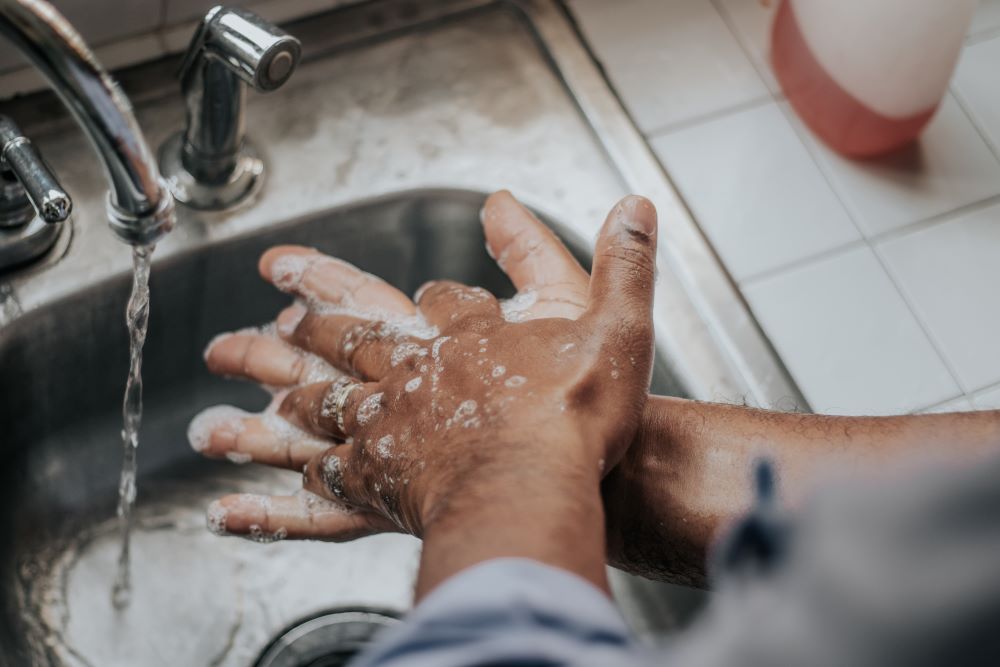Dirty toilets, filthy fridges, poorly air-conditioned offices and forced back on public transport – back to the office hygiene fears are spreading
In the dark and scared of returning to the office? You’re not alone as one in four UK employees (25 percent) are still fully remote with no known plans communicated about a return to the workplace, creating widespread confusion among workers.
Three quarters of staff (78 percent) are worried about the environment awaiting them, and a mere 16 percent of those set to return are fully confident about their health and safety back at the office, according to the new study*. It reveals mounting anxieties among the majority of returning workers that could spell productivity and retention trouble for employers.
Fears over dirty toilets, filthy fridges, poor air conditioning systems and colleague’s potentially lax attitudes towards hand hygiene has left millions of Brits dreading heading back to HQ, with 79 percent believing the potential for virus exposure will increase their stress levels at work.
Overall, 72 percent said they were not confident in their employer to make their place of work COVID-safe. Kastus’ study also found the stress caused by the threat of poor hygiene and the risk of exposure to COVID-19, would seriously increase stress levels at work. Possibly increasing the number of staff being treated for serious anxiety, these fears could rule staff out of a return on medical grounds.
Women experience more workplace COVID fears than men, although anxiety among both sexes remains extremely high. 83 percent of women state that worrying about COVID in shared workspaces would increase their stress levels versus 74 percent of men. Surprisingly, despite some studies showing that younger people want to be in a physical workspace more frequently than their older peers who have young children, the Kastus research showed that all age groups fear returning to workplaces until they’re confident the spaces have been made safe.
Chief Hygiene Officer
With only 28 percent of people feeling confident their employer is doing all that they can to ensure staff’s health and safety in the physical workspace, anecdotally many of those surveyed wanted bosses to incorporate colleagues’ behaviour into a suite of enforced hygiene rules and behaviours, resulting in a demand for a sort of ‘nanny boss’ or Chief Hygiene Officer.
But it’s not just the office making people edgy, it’s the commute and the lunch run too. The survey found that 3 in 4 (75 percent) of all employees are concerned about transmissible viruses on shared surfaces, like touchscreens, buttons, doors in the workplace. Even on the way to work, many people voiced concerns about picking up germs and viruses during their commute. For example, 64 percent are now just as worried about germs on train and underground ticket machines, fast-food self-service ordering screens, ATMs and supermarket checkouts.
Heidi Watson, Registered Psychologist, said: “94% of workers are stressed and 78% say that the pandemic has affected their mental health1. And recent research from psychologists studying the effects of the pandemic on workers found that, if physical safety concerns are left unaddressed particularly in the context of coming back to office after lockdowns, employees become disconnected from work and performance plummets. So, in this newly hyper vigilant era, to successfully get staff back to the workplace, motivate and retain them, bosses must address the basic hygiene and safety concerns effectively.”
Darragh O’Connor, VP of Global Marketing at Kastus, said: “It’s clear from the research that people are still concerned about the risk of catching viruses from shared spaces. Plus, they expect their employers to show they care and invest in the best possible hygiene defences.
There’s clearly a benefit for businesses to implement sustainable hygiene solutions such as the Kastus 24/7 antiviral screen protectors in terms of retention, productivity and recruitment. In fact, 77% of employees surveyed said they would feel more positive about a workplace return if a Kastus’ solution was in place. With less exposure to harm, and therefore less stress, it’s a simple way to encourage people back to the physical workspace.”
Case study one
Primary school teacher, St Albans (name available on request): ‘I think that without a doubt there will be an outbreak in my office. There are over 500 people in the office and it’s only a matter of time. Due to the unpredictable nature of the virus, this could be really serious!’
Case study two
Product manager, London (name available on request): “I prefer to be at the office around other people, but I visit my clinically vulnerable parents at least twice a week, so I’m worried about exposing them to harm. It’s really about other people not respecting boundaries and vulnerabilities, not distancing, not following hygiene guidance and the like.”
*Survey of more than 1,000 UK adults carried out by Kastus
1 Forbes, May 2021
2 Journal of Applied Psychology, 106, 2021









